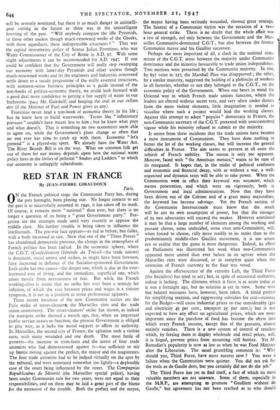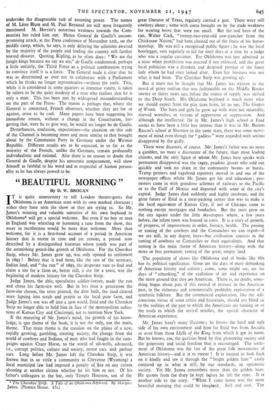RED STAR IN FRANCE
By JEAN-PIERRE GIRAUDOUX Paris.
ON the French political stage the Communist Party has, during the past fortnight, been playing star. No longer content to act the part it so successfully assumed in 1941, it has taken off its mask. Of course, it remains more " national " than ever, but there is no longer a question of its being a " great Government party." For- gotten are the attempts made until very recently to appease the middle class. No further trouble is being taken to influence the intellectuals. The pre-war face appears—as red as before, but fuller, with a body increased in size. Now that one of the " Three Forces " has abandoned democratic pretence, the change in the atmosphere of French politics has been radical. In the economic sphere, where the C.G.T. (Confederation Generale du Travail—the trade unions) is dominant, social unrest and strikes, as might have been foreseen, have increased in defiance of the Socialist-sponsored Government. Each strike has two causes—the deeper one, which is due to the ever- increased cost of living, and the immediate, superficial one, which arises mostly from nervousness or fear. But while the French working-class is aware that no strike has ever been a remedy for inflation, of which the race between prices and wages is a sinister symptom, it is not in a position to resist professional agitators.
Three recent instances of the new Communist tactics are the Paris strike of street-cleaners, the Marseilles riots and the trade union controversy. The street-cleaners' strike has shown, as indeed the transport strike showed a month ago, that, when an important public service ceases to function, the present Government is obliged to give way, as it lacks the moral support to affirm its authority. In Marseilles, the second city of France, the agitation took a violent Burn, with many wounded and one death. The most futile of pretexts—the increase in tram-fares and the arrest of four trade unionists who had demonstrated against it—was sufficient to stir up frantic rioting against the prefect, the mayor and the magistrates. The four trade unionists had to be judged virtually on the spot by the tribunal, and were sentenced somewhat too lightly—a deplorable case of the court being influenced by the street. The Compagnies Riroublicaines de Securite (the Marseilles special police), having been under Communist rule for two years, were not equal to their responsibilities, and on them may be laid a great part of the blame for the extension of the trouble. Both the prefect and the mayor, the mayor having been seriously wounded, showed great courage. The funeral of a Communist victim was the occasion of a two.' hour general strike. There is no doubt that the whole affair was a test of strength, not only between the Government and the Mar- seilles Communist-dominated C.G.T., but also between the former Communist mayor and his Gaullist successor.
Perhaps the most important of all, a clash in the national com- mittee of the C.G.T. arose between the majority under Communist dominance and the minority favourable to trade union independence. Two motions were presented by the Communist majority. In one, by 857 votes to 527, the Marshall Plan was disapproved ; the other, by a similar majority, suggested the holding of a plebiscite of workers in all factories, whether or not they belonged to the C.G.T., on the economic policy of the Government. When one bears in mind the Oriental way in which French trade unions function, where the leaders are elected without secret vote, and very often under threats from the more violent elements, little imagination is needed to visualise where such a project would lead the working classes. Against this attempt to adapt " popular " democracy to France, the non-Communist secretary of the C.G.T. protested with unaccustomed vigour while his minority refused to submit to the majority.
It seems from these incidents that the trade unions have become a mere instrument of Communism. They have done nothing to better the lot of the working classes, but will increase the general difficulties in France. The aim seems to prevent at all costs the rebirth of French stability. The reason is only too apparent. Moscow, faced with " the American menace," wants to be sure of its rearguard. It hopes that, in the midst of political confusion and economic and financial decay, with or without a war, a well- organised and dynamic team will be able to take power. When the Communists west in office their keyword was noyauter, which means penetration, and which went on vigorously, both in Government and local administrations. Now that they have been driven out of the Cabinet and of a great many mayoralties, the keyword has become sabotage. Yet the French section of the Communist Internationale must know that the result will be not its own assumption of power, but that the stronger of its two adversaries will succeed the weaker. However convinced it may be that a large number of elements among the working and peasant classes, some undecided, some even anti-CommUnist, will, when forced to choose, rally more readily to its ranks than to the predominantly middle-class Gaullist movement, it is too astute not to realise that the game is most dangerous. Indeed, its effect on Parliament was illustrated last week when non-Communists appeared more united than ever before in an uproar when the Marseilles riots were discussed, or in complete quiet when the extension of French currency to the Saar was voted.
Against the effervescence of the extreme Left, the Third Force (the Socialists) has tried to act ; but, in spite of occasional outbursts, ardour is lacking. The dilemma which it faces is as acute today as it was a fortnight ago, but no solution is yet in view. Some wise but belated measures have, however, been taken. A timid project for simplifying taxation, and suppressing subsidies for coal—ruinous for the Budget—will cause industrial prices to rise considerably (gas and electricity 4 per cent., transport 25 per cent.); but is not expected to have any effect on agricultural prices, which are more important since the purchase of food has become the abyss into which every French income, except that of the peasants, almost entirely vanishes. There is a new system of control of retailers which, by forcing them to display wholesale and retail prices, will, it is hoped, prevent prices from mounting still further. Yet M. Ramadier's popularity is now as low as when he was Food Minister after the Liberation. The usual grumbling comment is: " Why should you, Third Force, have more success now ? You were a failure when the Communists were quieter. You did not ask for the tools as de Gaulle does, but you certainly did not do the job."
The Third Force has yet to find itself, a fact of which its most valuable members are not unaware. Some of them, especially in the M.R.P., are attempting to promote " Gaullism without de Gaulle," but agreement has not been reached as to who should undertake the disagreeable task of assuming power. The names of M. Leon Blum and M. Paul Reynaud are still most frequently mentioned. M. Herriot's notorious weakness towards the Com- munists has ruled him out. Hence General de Gaulle's uncom- promising attack, at the Press conference of November 12th, on the middle camp, which, he says, is only delaying the solutions awaited by the majority of the people and leading the country still further toward disaster. Quoting Kipling, as he often does: "We are the jungle kings because we say we are," de Gaulle condemned, perhaps a little unfairly, the Third Force as a political combination trying to convince itself it is a force. The General made it clear that he was as determined as ever not to collaborate with a Parliament which he thinks no longer representative—without the tools. This, while it is considered in some quarters as immense vanity, is taken by others to be the quiet modesty of a man who realises that he is only a man. This has been met by widespread misunderstanding on the part of the Press, The reason is perhaps that, where the General is concerned, French observers, whether they are for or against, cease to be cool. Many papers have been suggesting his immediate return, without a change in the Constitution, for- getting that, were he to give way, he would no longer be de Gaulle.
Disturbances, confusion, expectations—the situation on this side of the Channel-is becoming more and more similar to that brought about by the Communist Party in Germany under the Weimar Republic. Different results are to be expected, in so far as the majority of the French, unlike the Germans; remain profoundly individualistic and rational. Also there is no reason to doubt that General de Gaulle, despite his autocratic temperament, will show himself as faithful to his word and as respectful of human person- ality as he has always proved to be.



































 Previous page
Previous page